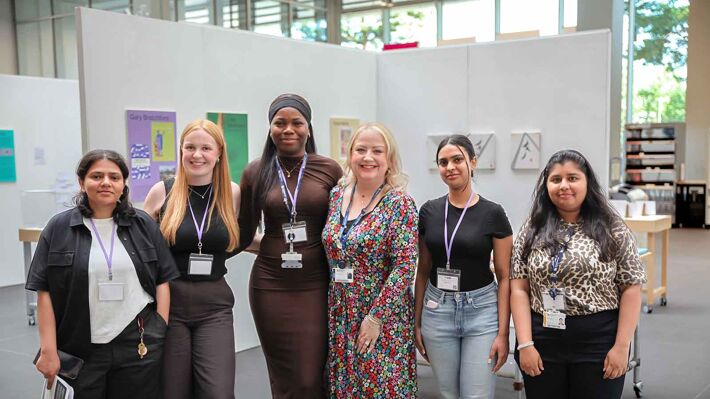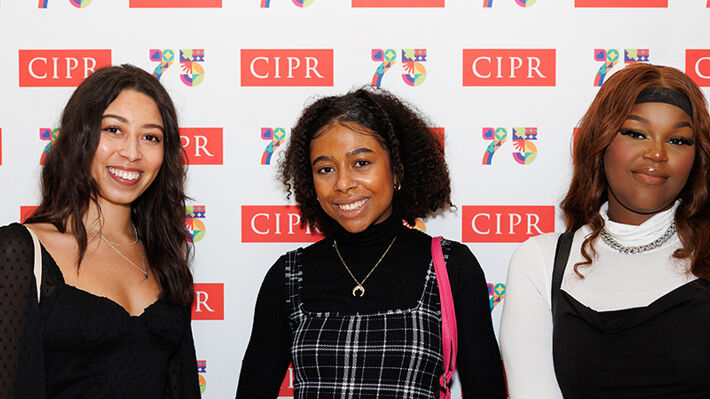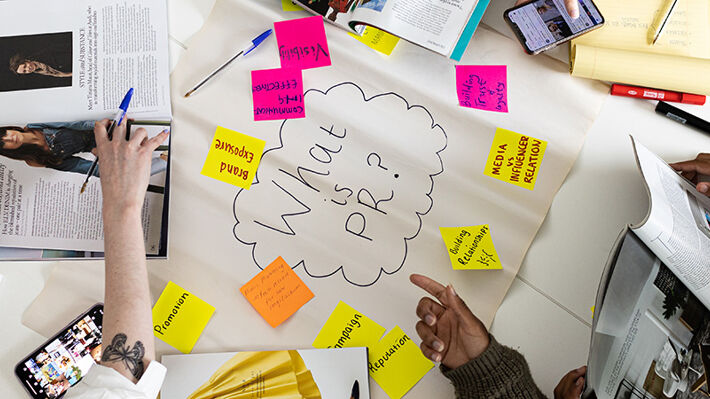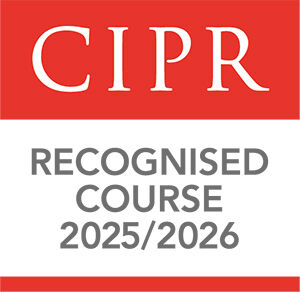Public Relations - MA
Currently viewing course to start in 2026/27 Entry.
Public Relations shapes our world. Organisations use PR to get noticed, to change opinions, and pass on vital information that helps us to make decisions about health, education and welfare. PR is a fast-growing discipline, employing 83,000 people in a £13bn industry offering a wide range of job opportunities....
- Level Postgraduate Taught
- Study mode Full Time
- Award MA
- Start date September 2026
- Fees View course fees
- Subject
- Location City Centre
This course is:
Available with Professional Placement option
Open to International Students
Overview
Scholarships are available for this course. Find out more and apply now
Public Relations shapes our world. Organisations use PR to get noticed, to change opinions, and pass on vital information that helps us to make decisions about health, education and welfare. PR is a fast-growing discipline, employing 83,000 people in a £13bn industry offering a wide range of job opportunities.
Our MA teaches you how to construct an effective PR campaign, combining theory with the practical skills needed to communicate persuasively on behalf of businesses, charities, public bodies, community groups and activists.
What's covered in this course?
The MA Public Relations course teaches you how to construct effective PR and social media campaigns, combining theory with the practical skills needed to communicate persuasively on behalf of businesses, brands, charities, public bodies and communities.
It is about reputation, influence, engagement and content creation.
The course brings together theory and practice, combining real intellectual challenge with a sharp focus on real-world events and firmly grounded in extensive industry links. We look at techniques for raising awareness, listening to stakeholders and influencing ethical policies.
We explore the ever-changing media landscape while critically examining PR’s impact on
society. The course is recognised by the leading professional body for PR in the UK, the
Chartered Institute of Public Relations.
The teaching team works closely with employers from public and private sector organisations, B2B and B2C, lifestyle and health, who support us with visiting speakers, case studies and mentoring, enabling you to engage with emerging PR challenges.
On completing this course, you will have the skills and understandings employers require for the role of entry-level account executive.
Professional Placement option
This course offers an optional professional placement. This allows you to spend 20 weeks with an employer, following completion of your taught modules, and is a great way to enhance your employability.
The experience you gain through your placement will allow you to evidence your professional skills, attitudes and behaviours at the point of entry to the postgraduate job market.
If you choose the placement option, you will be responsible for finding and securing a suitable placement to complement your chosen area of study. You will be able to draw on the University’s extensive network of local, regional and national employers, and the support of our Careers teams. If you do not secure a suitable placement, you will automatically be transferred back to the standard, non-placement version of the course.
Please note: Placements will only be confirmed following a competitive, employer-led selection process. As such, the University will not be able to guarantee placements for students who have registered for the professional placement option.
Accredited By
This course is accredited by:
Why Choose Us?
- The course is recognised by the UK’s leading professional body, the Chartered Institute of Public Relations (CIPR). The Midlands has a thriving PR and communications community and BCU has hosted the CIPR Midlands PR Conference since it began in 2017, with students gaining hands-on experience and a front-row seat
- Blend of theory and practice and a dynamic teaching experience, to help students develop a variety of in-demand skills
- Accomplished academic staff who have rich professional backgrounds and remain active in the industry
- Emphasis on employability, students build their professional profiles and networks whilst studying
- Excellent industry links and partnerships mean that students benefit from guest talks, industry insights, and working on real briefs
- Wide range of potential career paths, from PR, social media management and content creation, to marketing roles and event management
Entry Requirements
Essential requirements
Applicants are normally expected to have a minimum of a 2:2 honours degree, or equivalent, in any subject. We will also consider applicants with significant experience in PR, journalism or in a similar type of communication role who are able to demonstrate outstanding ability and potential.
Applying with international qualifications
See below for further information on applying as an international student.
If you have a qualification that is not listed, please contact us.
Fees & How to Apply
UK students
Annual and modular tuition fees shown are applicable to the first year of study. The University reserves the right to increase fees for subsequent years of study in line with increases in inflation (capped at 5%) or to reflect changes in Government funding policies or changes agreed by Parliament. View fees for continuing students.
Award: MA
Starting: Sep 2026
- Mode
- Duration
- Fees
- Full Time
- 1 year
- £10,350 in 2026/27
- Full Time
- 18 months (including Professional Placement)
- £11,385 in 2026/27
International students
Annual and modular tuition fees shown are applicable to the first year of study. The University reserves the right to increase fees for subsequent years of study in line with increases in inflation (capped at 5%) or to reflect changes in Government funding policies or changes agreed by Parliament. View fees for continuing students.
Award: MA
Starting: Sep 2026
- Mode
- Duration
- Fees
- Full Time
- 1 year
- £18,970 in 2026/27
- Full Time
- 18 months (including Professional Placement)
- £20,865 in 2026/27
Application deadlines
We advise you to apply early to allow sufficient time for you to prepare to start your studies in September. Please apply by Friday 17 July to allow time to arrange accommodation, student finance and visas where required.
Late applications will be accepted where places are still available.
To find out more, see our application timeline.
Personal statement
You’ll need to submit a personal statement as part of your application for this course. This will need to highlight your passion for postgraduate study – and your chosen course – as well as your personal skills and experience, academic success, and any other factors that will support your application for further study.
If you are applying for a stand alone module, please include the title of the module you want to study in your Personal Statement.
Not sure what to include? We’re here to help – take a look at our top tips for writing personal statements and download our free postgraduate personal statement guide for further advice and examples from real students.
Course in Depth
Modules
In order to complete this course you must successfully complete all the following CORE modules (totalling 180 credits):
PR Theory and Context teaches the fundamental elements of PR theory and discusses the societal implications of PR practice.
It examines the various roles a PR practitioner might perform, including relationship-building, media relations, PR and promotion, issues management and crisis PR. In a broader context it looks at notions of reputation, public opinion, civic discourse, inclusivity, CSR/ESG and sustainability, taking care to consider these debates in an international context.
This module considers many varying and often conflicting definitions of public relations. It considers the evolution of PR as a discipline, and critically examines the impact of PR on society. It positions PR primarily as relationship management.
Emphasis is placed on understanding the fluid and changing nature of PR, including responses to the continual evolution of digital platforms and channels. Students are encouraged to consider ethical issues surrounding public relations activity, including power imbalances and tensions around truth, persuasion, authenticity, transparency and legitimacy. and seeks to explain how and why people make decisions about behaviours, from building brand identity to influencing lifestyle choices.
The module develops the ability to consider public relations as a strategic activity and builds familiarity with the public relations toolkit – the range of tactical devices employed for delivering organisational messages and engaging with a range of stakeholder groups. This includes developing techniques for measuring and evaluating the effectiveness of PR activity.
The module is delivered through a fluid structure of short lectures, discussions and practical work, including close examination of case studies and regular engagement with PR practitioners. Students are encouraged to join the Chartered Institute of Public Relations (CIPR), and to take part in CIPR regional activities. The content of this module and others in the MA suite are informed by regular discussions with an advisory panel made up of prominent PR practitioners.
The module is an opportunity to learn and critically reflect on the skills of collaboration by
enabling you to create a research-informed interdisciplinary project with students from
complementary disciplines, or with academic staff.
Collaboration is a vital employability skill within the Creative Industries and this module
allows you to develop professional key interpersonal and communications skills, share
knowledge and ideas, and engage in collective strategic planning, diagnostic analysis and peer support. Working in an interdisciplinary team will help you to learn beyond your own subject boundaries, which is central to the STEAM (Science, Technology, Engineering, Arts and Mathematics) philosophy of education and resembles work patterns within the creative industries.
In the module you will produce an interdisciplinary and imaginative group project outcome supported by an in-depth critical evaluation.
Within this module framework, several kinds of collaborative opportunities are available. For example, your supervisor may set you a predetermined project to enable you to work
with other students in a cross-course project; there may be opportunities for you to
collaborate with staff on research projects; or your supervisor may engage you in a
collaborative group brief with a professional client, community or agency.
This module builds key transferable core skills that are needed to work within a modern multiplatform media industry, including the ability to identify and communicate stories for specific audiences; to recognise story formats across multiple platforms along with their generic qualities; to plan and collect information needed for storytelling purposes (including interviews); to write for a range of platforms; and employ multiple media forms.
These skills will help the student develop employable skills in identifying, planning and executing storytelling projects across multiple platforms and media, including emerging formats.
A mixed methods pedagogical approach is adopted, combining lectures with hands-on workshops where students produce stories within their own professional contexts, exploring cycles of pre- production, production and post-production activities. Supplementary technical sessions provide specialist skills with particular media to an advanced technical level. Teaching builds towards an assessed project that demonstrates the application of editorial, creative and practical skills, alongside an evaluation which evidences a methodical and critical approach to all three stages of production.
Fundamentally, PR is about relationships, reputation, and communicating value. In practice, it requires an understanding of positioning, perception and persuasion. Reputation, Influencer, and Crisis Management examines principles of brand building, image, vision, mission, values and purpose and considers the techniques employed to develop and influence stakeholder relationships and bring about change for an organisation. It also looks at issues, risk, and crisis management principles and scenarios, providing students with the chance to develop critical understandings and equip them to devise creative solutions to reputational and communications challenges.
The module considers a range of communications platforms and channels, including traditional media, social media, and influencer marketing, and explores ways in which they can be used to engage with various stakeholders, often in complex circumstances, to affect awareness, acceptance, and action.
The module provides a breadth-and-depth view into the planning and management of communication and PR campaigns, encompassing broad areas of practice including corporate, internal, and not-for-profit communications, spanning a wide range of sectors. It explores the PR strategies and techniques organisations can employ to project favourable messaging, to enhance credibility and reputation, and thereby improve their day-to-day operations.
Throughout the module, students are challenged to identify the factors that shape their own opinions, views, likes, and dislikes. How do you find out about new products, places, and services? What influences your lifestyle choices? How should an organisation try and communicate with you? What would catch your attention? What would persuade you to make a particular decision?
The module further develops theory and practice to give a deeper insight into the processes and practices of the PR discipline, enabling students to hone valuable skills to enhance their potential as well-rounded, thoughtful, and prepared professionals.
The module is intended to help you develop and consolidate your ideas for your MA Major Project. By providing a common module that comprises of all MA Media cohorts, Research in Practice aims to facilitate a shared skillset that aids the successful completion of the MA Major project, as well as the potential for routes into PhD progression beyond. It is also designed to encourage interdisciplinary discussions across MA awards.
Strategic Communication: Planning and Delivery teaches the essential skills of strategic campaign planning and develops an appreciation of a range of tactical devices. Content includes planning models; situational analysis; audience, market, and competitor research; stakeholder analysis; strategic thinking: determining objectives, messages, and tactics; delivery – resources and timescales; evaluation.
The emphasis is on communication for commercial organisations. Throughout the module, students are reminded that PR can be seen as a strategic management function designed to deliver organisational objectives over the short, medium, and long-term.
On completion, students will be equipped to outline and develop the key elements of a campaign proposal to a standard expected of an account executive. It also provides a firm foundation for those students wishing to develop a practical Major Project in PR.
Students are encouraged to join the CIPR, and to take part in CIPR regional activities. The content of this module and others in the MA suite are informed by regular discussions with an advisory panel made up of prominent PR practitioners.
The purpose of the module is to enable you to undertake a sustained, in-depth and theoretically informed research project exploring an area that is of personal interest to you. It is important that we can support you appropriately, so you will be guided towards choosing a research topic which is relevant to your discipline and in which your lecturers have expertise. The outcome may take the form of a written dissertation or a practical outcome with accompanying reflective, critical and contextual material. The main consideration when choosing your topic is that it must be relevant to your programme and you should consider the relevance of this topic to your future academic or professional development.
Download course specification
Download nowMA Public Relations takes a year to complete, full-time. You study three modules in Semester One (Sept-Jan), three in Semester Two, (Feb-May) then complete a dissertation or practical project that you submit in late August.
Classroom activities and projects
Mixing theory and practice we work together to plan campaigns, dissect case studies, and analyse topical examples. You will hone your presentation skills, and learn to talk confidently and persuasively on behalf of a range of organisations.
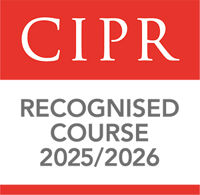
Chartered Institute of Public Relations
This course is recognised by the Chartered Institute of Public Relations (CIPR).
Employability
Employment Opportunities
There are many opportunities for PR students at Birmingham to build strong links with the professional community in the region and worldwide.
PR programmes taught at this university are supported by a wide range of practitioners who provide case studies, live projects and placement opportunities. You will have several opportunities for direct contact with employers through BCU hosted workshops and talks, as well as at industry events, thanks to the University’s close working relationship with the Chartered Institute of Public Relations (CIPR) and its Midlands committee.
As a result of studying PR at this university, you will not only build up the knowledge and skills needed for employment in the public or private sectors, but also a level of professional experience of live project and campaign work plus a network of contacts that will dramatically enhance your employability prospects.
Facilities & Staff

Our Facilities
When you join Birmingham City University, the first thing you will notice is the high standard of our campuses.
With an investment of over £500 million across our buildings and facilities, we are committed to giving you the very best learning environment to help shape your experience.
State-of-the-art facilities
You will learn in our state-of-the-art facilities - including the £62m fully-digital Media Centre - located on the City Centre Campus. You will enjoy access to extensive studio and workshop space including four TV studios, six radio studios and broadcast-standard edit suites, as well as cutting-edge equipment and software.
Facilities include one of the largest TV floors of any university in the UK, a ‘green screen’ and a BOLT JR+ high-speed camera robot.
Our staff
Kelly O’Hanlon
Course Director for MA Public Relations; Senior Lecturer in the Department of English and Media
Kelly has worked in the public relations industry for more than 20 years, both agency and in-house, consumer and B2B. A former BCU student herself, Kelly graduated in 2005 with a BA in Media and Communications, in 2017 with a PGCE in Higher Education, and again in 2018 with an MA in Public Relations.
More about Kelly


